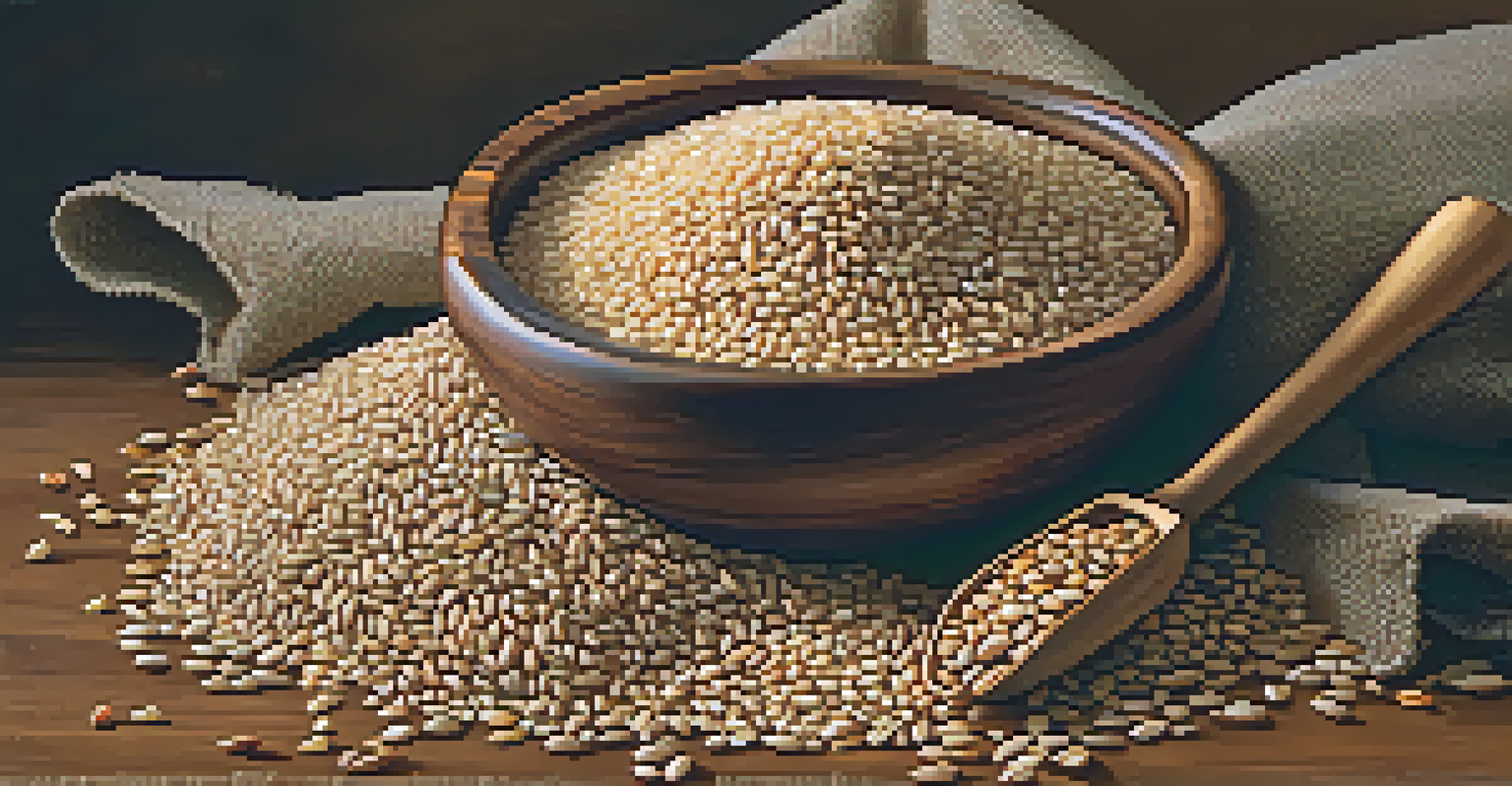The Importance of Fiber in Your Diet for Overall Health

What is Dietary Fiber and Why Does It Matter?
Dietary fiber refers to the parts of plant foods that your body can't digest. Unlike other nutrients like fats, proteins, and carbohydrates, fiber passes through your digestive system relatively intact. This indigestibility is what makes fiber so crucial for maintaining a healthy gut.
Let food be thy medicine and medicine be thy food.
There are two main types of fiber: soluble and insoluble. Soluble fiber dissolves in water and can help lower blood cholesterol and glucose levels, while insoluble fiber adds bulk to your stool, aiding digestion. Both types play unique roles but are essential for overall health.
Including a variety of fiber-rich foods in your diet ensures that you're getting both types. Think of fiber as a broom, sweeping through your digestive tract and helping to keep everything running smoothly!
Fiber's Role in Digestive Health
One of the primary benefits of fiber is its ability to promote healthy digestion. A diet rich in fiber can prevent constipation by adding bulk to your stool, making it easier to pass. This is especially important as we age, as our digestive systems can slow down.

Moreover, fiber helps maintain a healthy gut microbiome, which is essential for digestion and overall health. When you eat fiber, beneficial bacteria in your gut ferment it, producing short-chain fatty acids that nourish your colon cells.
Fiber Supports Digestive Health
Dietary fiber promotes healthy digestion by preventing constipation and nourishing beneficial gut bacteria.
Think of your gut as a garden; fiber is the fertilizer that helps it flourish. Without it, the beneficial bacteria may not thrive, leading to digestive issues and an imbalance in gut health.
How Fiber Aids in Weight Management
Fiber can be a powerful ally in weight management. Foods high in fiber are often more filling, which can help you feel satisfied longer and reduce overall calorie intake. This can be particularly beneficial if you're trying to lose or maintain weight.
You are what you eat, so don't be fast, cheap, easy, or fake.
Additionally, fiber slows down the digestion of food, which helps control blood sugar levels. When your blood sugar levels are stable, you're less likely to experience the hunger pangs that can lead to overeating.
Picture fiber as a gentle traffic cop in your body, regulating the flow of food and helping you navigate your appetite more effectively.
Fiber and Heart Health: The Connection
Incorporating fiber into your diet can significantly benefit heart health. Soluble fiber, in particular, helps lower cholesterol levels, which is a key factor in reducing the risk of heart disease. When combined with a heart-healthy diet, fiber can be a game-changer.
Studies have shown that individuals with a higher fiber intake tend to have lower risks of cardiovascular issues. This is because fiber helps reduce inflammation and improve arterial function, contributing to better overall heart health.
Fiber Aids Weight Management
High-fiber foods help you feel full longer, reducing calorie intake and stabilizing blood sugar levels.
Think of your heart as a car engine; fiber acts like quality oil, keeping everything running smoothly and efficiently while reducing wear and tear.
The Impact of Fiber on Blood Sugar Control
Fiber plays a crucial role in managing blood sugar levels, especially for those with diabetes. Soluble fiber slows the absorption of sugar, helping to improve blood sugar control. This can lead to more stable energy levels throughout the day.
When you consume fiber alongside carbohydrates, it can help mitigate spikes in blood sugar. This is particularly important for anyone looking to manage their insulin sensitivity.
Imagine fiber as a buffer; it smooths out the peaks and valleys of your blood sugar, helping you maintain steady energy and focus.
How Much Fiber Do You Need Daily?
The recommended daily fiber intake varies depending on age and gender, but a general guideline is about 25 grams for women and 38 grams for men. Most Americans, however, fall short of these recommendations, often consuming only about half.
To easily increase your fiber intake, focus on whole foods such as fruits, vegetables, whole grains, legumes, and nuts. Incorporating these foods into your diet can make a significant difference in your overall health.
Fiber Benefits Heart Health
Incorporating soluble fiber into your diet can lower cholesterol levels and reduce the risk of heart disease.
Think of fiber as a puzzle piece; the more you include it in your meals, the clearer the picture of your health becomes!
Tips for Increasing Fiber in Your Diet
Increasing fiber in your diet doesn't have to be overwhelming. Start by gradually adding fiber-rich foods to your meals, such as swapping white bread for whole grain or adding beans to your salads. Small changes can lead to significant results over time.
Snacking on fruits, vegetables, and whole grain options can also boost your fiber intake without much effort. For example, a handful of almonds or an apple can provide a satisfying and healthy snack.

Think of fiber as a friendly companion on your healthy eating journey; the more you welcome it into your meals, the better your overall health will become!